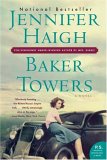Summary | Excerpt | Reading Guide | Reviews | Readalikes | Genres & Themes | Author Bio

"These Slavish," he said, as if only a
Pole would drop dead in the middle of winter and expect to be buried in a
snowstorm.
The train passed, whistle blowing. The Packard
crossed the tracks and climbed a steep road lined with company houses, a part of
town known as Polish Hill. The road was loose and rocky; the coarse stones,
called red dog, came from bony piles on the outskirts of town. Black smoke rose
from the chimneys; in the backyards were outhouses, coal heaps, clotheslines
stretched between posts. Here and there, miners’ overalls hung out to dry,
frozen stiff in the January wind.
"These Slavish," Bernardi said again.
"They live like animali." At one time, his own brothers had
lived in company houses, but the family had improved itself. His nephews owned
property, houses filled with modern comforts: telephones and flush toilets, gas
stoves and carpeted floors.
"Papa," said Jerry, glancing at the
boy; but the child seemed not to hear. He stared out the window wide-eyed,
having never ridden in a car before. His name was Sandy Novak; he’d come
knocking at Bernardi’s back door an hour before—breathless, his nose
dripping. His mother had sent him running all the way from Polish Hill, to tell
Bernardi to come and get his father.
The car climbed the slope, engine racing. Briefly
the tires slid on the ice. At the top of the hill Jerry braked.
"Well?" said the old man to the boy.
"Where do you live?"
"Back there," said Sandy Novak.
"We passed it."
Bernardi exhaled loudly. "Cristo. Now
we got to turn around."
Jerry turned the car in the middle of the road.
"Pay attention this time," Bernardi
told the boy. "We don’t got all day." In fact he’d buried nobody
that week, but he believed in staying available. Past opportunities—fires,
rockfalls, the number five collapse—had arisen without warning. Somewhere in
Bakerton a miner was dying. Only Bernardi could deliver him to God.
The Bernardis handled funerals at the five
Catholic churches in town. A man named Hiram Stoner had a similar arrangement
with the Protestants. When Bernardi’s black Packard was spotted, the town knew
a Catholic had died; Stoner’s Ford meant a dead Episcopalian, Lutheran or
Methodist. For years Bernardi had transported his customers in a wagon pulled by
two horses. During the flu of ’18 he’d moved three bodies at a time.
Recently, conceding to modernity, he’d bought the Packard; now, when a
Catholic died, a Bernardi nephew would be called upon to drive. Jerry was the
last remaining; the others had been sent to England and northern Africa. The old
man worried that Jerry, too, would be drafted. Then he’d have no one left to
drive the hearse.
"There it is," the boy said, pointing.
"That’s my house."
Jerry slowed. The house was mean and narrow like
the others, but a front porch had been added, painted green and white. One
window, draped with lace curtains, held a porcelain statue of the Madonna. In
the other window hung a single blue star.
"Who’s the soldier?" said Jerry.
"My brother Georgie," said Sandy, then
added what his father always said. "He’s in the South Pacific."
They climbed the porch stairs, stamping snow from
their shoes. A woman opened the door. Her dark hair was loose, her mouth full. A
baby slept against her shoulder. She was beautiful, but not young—at least
forty, if Bernardi had to guess. He was like a timberman who could guess the age
of a tree before counting the rings inside. He had rarely been wrong.
She let them inside. Her eyelids were puffy, her
eyes rimmed with red. She inhaled sharply, a moist, slurry sound.
Bernardi offered his hand. He’d expected the
usual Slavish type: pale and round-faced, a long braid wrapped around her head
so that she resembled a fancy pastry. This one was dark-eyed, olive-skinned. He
glanced down at her bare feet. Italian, he realized with a shock. His mother and
sisters had never worn shoes in the house.
The foregoing is excerpted from Baker Towers by Jennifer Haigh. All rights reserved. No part of this book may be used or reproduced without written permission from HarperCollins Publishers, 10 East 53rd Street , New York , NY 10022
Great political questions stir the deepest nature of one-half the nation, but they pass far above and over the ...
Click Here to find out who said this, as well as discovering other famous literary quotes!
Your guide toexceptional books
BookBrowse seeks out and recommends the best in contemporary fiction and nonfiction—books that not only engage and entertain but also deepen our understanding of ourselves and the world around us.